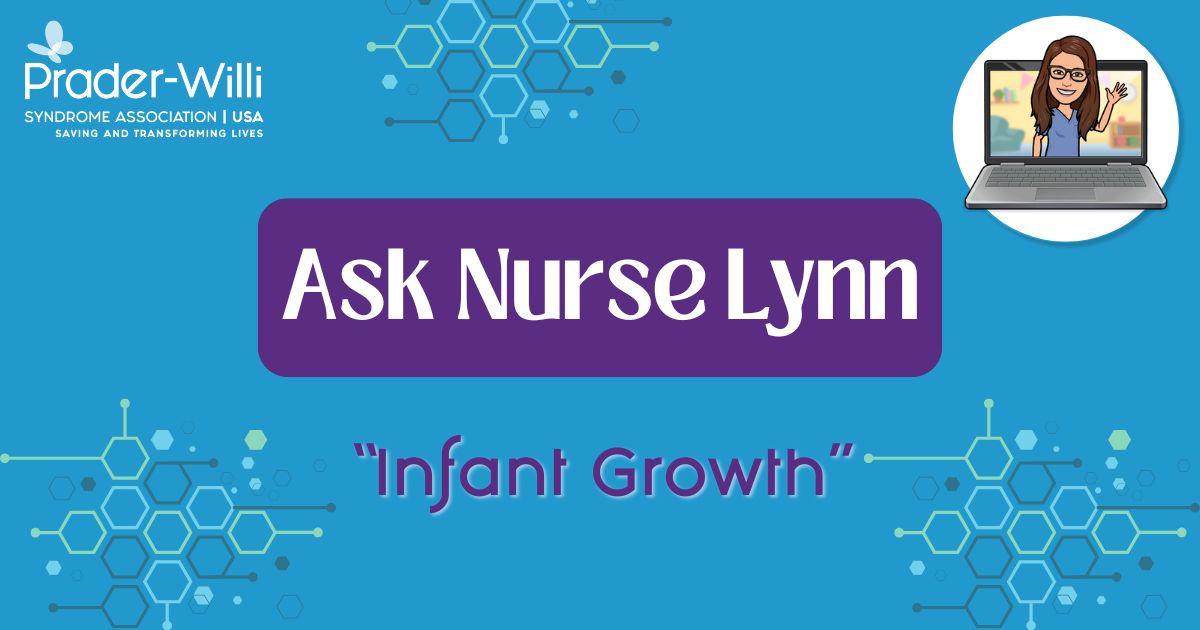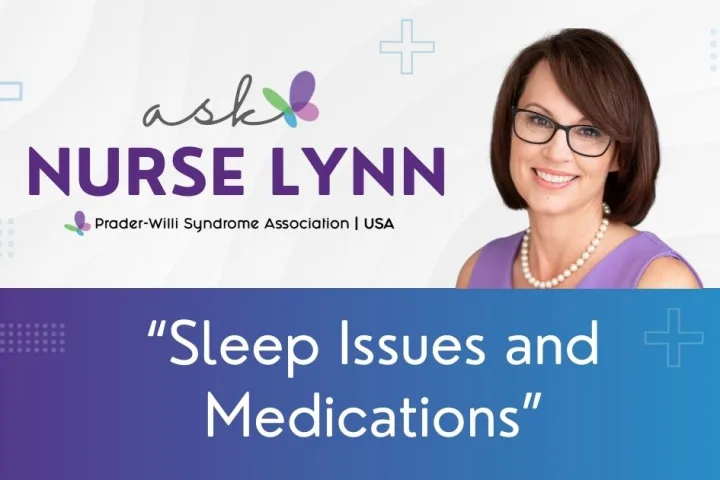Question:
Female, 5 months old, Deletion subtype
My baby is 5 months old. The growing is not fast, 5 month looks like 2 months.
What do I do?
Nurse Lynn’s Response:
I’m sorry to hear about your concerns regarding your baby’s growth, here are some suggestions:
Consult with a Pediatric Endocrinologist:
- Schedule regular check-ups to monitor your baby’s growth. The pediatric endocrinologist will track growth metrics using PWS-specific growth charts for a more accurate assessment.
Growth Hormone Therapy:
- Early initiation of growth hormone therapy is critical and has shown to improve growth, body composition, and motor development in children with PWS.
- Request an evaluation for growth hormone therapy if it hasn’t been initiated yet. Your endocrinologist will perform tests including IGF-1/IGFBP-3 levels to ensure safety.
Nutrition:
- Ensure your baby is receiving adequate nutrition. Babies with PWS have poor muscle tone (hypotonia), which can make feeding difficult. There are specialized bottles and nipples that may help.
- Breastfeeding or formula feeding might require techniques to improve intake. Some babies might require fortified formulas/ breastmilk or even supplemental tube feeding in some cases.
- Collaborate with a dietitian familiar with PWS to develop a tailored feeding plan. This can address poor weight gain in infancy while preventing later complications such as obesity.
Specialist Involvement:
- Assemble a multidisciplinary team to provide comprehensive care including:
- Nutritionist: To optimize feeding strategies and ensure adequate growth without overfeeding.
- Physical Therapist: To address hypotonia and improve motor skills.
- Speech Pathologist: To help with feeding difficulties, oral motor skills, and later language development.
- Endocrinologist: For growth monitoring and hormone therapy.
- Geneticist (if not already involved): To provide ongoing education and support for managing PWS-related challenges.
Resources:
I have linked several articles/ resources for you and your providers that may be helpful.
Growth-Hormone-booklet-third-Edition_FINAL.pdf
Growth Standards of Infants With Prader-Willi Syndrome | Pediatrics | American Academy of Pediatrics
Do you have a question for Nurse Lynn? Submit your question here:
Share this!





 Perry A. Zirkel has written more than 1,500 publications on various aspects of school law, with an emphasis on legal issues in special education. He writes a regular column for NAESP’s Principal magazine and NASP’s Communiqué newsletter, and he did so previously for Phi Delta Kappan and Teaching Exceptional Children.
Perry A. Zirkel has written more than 1,500 publications on various aspects of school law, with an emphasis on legal issues in special education. He writes a regular column for NAESP’s Principal magazine and NASP’s Communiqué newsletter, and he did so previously for Phi Delta Kappan and Teaching Exceptional Children. Jennifer Bolander has been serving as a Special Education Specialist for PWSA (USA) since October of 2015. She is a graduate of John Carroll University and lives in Ohio with her husband Brad and daughters Kate (17), and Sophia (13) who was born with PWS.
Jennifer Bolander has been serving as a Special Education Specialist for PWSA (USA) since October of 2015. She is a graduate of John Carroll University and lives in Ohio with her husband Brad and daughters Kate (17), and Sophia (13) who was born with PWS. Dr. Amy McTighe is the PWS Program Manager and Inpatient Teacher at the Center for Prader-Willi Syndrome at the Children’s Institute of Pittsburgh. She graduated from Duquesne University receiving her Bachelor’s and Master’s degree in Education with a focus on elementary education, special education, and language arts.
Dr. Amy McTighe is the PWS Program Manager and Inpatient Teacher at the Center for Prader-Willi Syndrome at the Children’s Institute of Pittsburgh. She graduated from Duquesne University receiving her Bachelor’s and Master’s degree in Education with a focus on elementary education, special education, and language arts. Evan has worked with the Prader-Willi Syndrome Association (USA) since 2007 primarily as a Crisis Intervention and Family Support Counselor. Evans works with parents and schools to foster strong collaborative relationships and appropriate educational environments for students with PWS.
Evan has worked with the Prader-Willi Syndrome Association (USA) since 2007 primarily as a Crisis Intervention and Family Support Counselor. Evans works with parents and schools to foster strong collaborative relationships and appropriate educational environments for students with PWS. Staci Zimmerman works for Prader-Willi Syndrome Association of Colorado as an Individualized Education Program (IEP) consultant. Staci collaborates with the PWS multi-disciplinary clinic at the Children’s Hospital in Denver supporting families and school districts around the United States with their child’s Individual Educational Plan.
Staci Zimmerman works for Prader-Willi Syndrome Association of Colorado as an Individualized Education Program (IEP) consultant. Staci collaborates with the PWS multi-disciplinary clinic at the Children’s Hospital in Denver supporting families and school districts around the United States with their child’s Individual Educational Plan. Founded in 2001, SDLC is a non-profit legal services organization dedicated to protecting and advancing the legal rights of people with disabilities throughout the South. It partners with the Southern Poverty Law Center, Protection and Advocacy (P&A) programs, Legal Services Corporations (LSC) and disability organizations on major, systemic disability rights issues involving the Individuals with Disabilities Education Act (IDEA), Americans with Disabilities Act (ADA), and the federal Medicaid Act. Recently in November 2014, Jim retired.
Founded in 2001, SDLC is a non-profit legal services organization dedicated to protecting and advancing the legal rights of people with disabilities throughout the South. It partners with the Southern Poverty Law Center, Protection and Advocacy (P&A) programs, Legal Services Corporations (LSC) and disability organizations on major, systemic disability rights issues involving the Individuals with Disabilities Education Act (IDEA), Americans with Disabilities Act (ADA), and the federal Medicaid Act. Recently in November 2014, Jim retired.